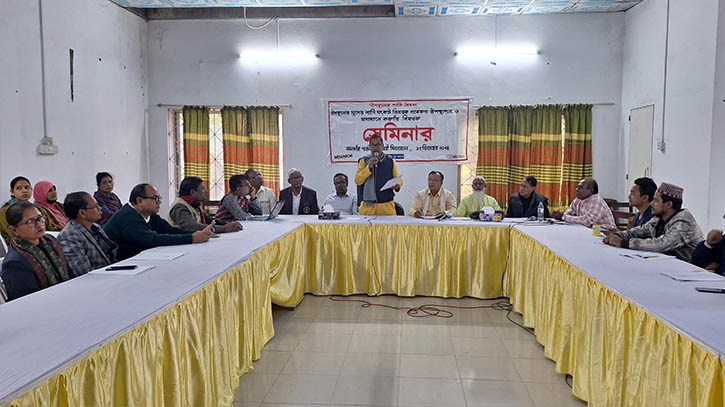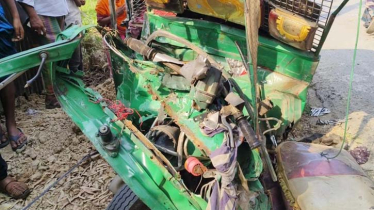
photo: Messenger
A seminar was held in Satkhira presenting a research paper on the issue of safe water crisis of Shymnagar coastal area.
Research organization Bangladesh Resource Center for Indigenous Knowledge (BARCIK) organized this seminar on Tuesday (December 17) at Satkhira Central Public Library auditorium.
Journalists and researcher Tanzir Kochi and Sultan Shahajan jointly presented the research paper in the seminar titled ‘Water crisis in Shymnagar Coastal area; Where is the solution?’
According to the research paper, due to the salinity of underground water, there is always a shortage of fresh water in Shyamnagar of Satkhira. Since the beginning of human settlement in this region in the lap of Sundarbans, people have been engaged in the struggle to collect fresh water. The kings of the time, later landlords and rich people took initiative to dig ponds, dighi or wells to alleviate the shortage of fresh water or to save lives.
Since the beginning of settlement till now, the main source of livelihood of the people of Shyamnagar region is water from ponds. But due to climate change, frequent natural disasters in the coastal region, increase in salinity, unplanned expansion of brackish water shrimp farming area, non-renovation of ponds and dams, non-digging of new ponds and dams as required, fresh water crisis has become evident in Shyamnagar region. Various initiatives have been taken and implemented at the government and private levels to eliminate this crisis. But there is no sustainable solution to the fresh water crisis. Instead, new crises have arisen around these initiatives.
In order to solve the problem of fresh water, public and private initiatives are being carried out by setting up or renovating PSF, distributing tanks for rainwater storage, setting up reverse osmosis plants etc. But due to various reasons, modern technology is not able to successfully play a role in solving the fresh water crisis.
At the same time, agriculture in Shyamnagar region is having a serious negative impact due to the reduction of freshwater sources. For this, agricultural land is being converted into brackish water zones under the influence of salinity. Crop production is decreasing. Farmers' costs are increasing. People are turning away from agriculture day by day. Losing a job. Cultivation is not done in other seasons except monsoon season. The financial loss is increasing. Biodiversity is disappearing. Ecosystems are being damaged. Native fish are disappearing. Fruit trees are declining. Cattle are decreasing. Snails, Ketchos, Jokes, Frogs are disappearing from nature.
Malnutrition has increased in Shyamnagar region due to loss of plant-food diversity. Employment has declined. People are forced to change profession. Increased waterborne skin diseases, night blindness, diarrhea, dysentery. Menstrual problems of women have become prominent. In a word, health risks are increasing. Along with this, medical expenses are also increasing.
The pond is the last hope of the people of Shyamnagar to solve the shortage of fresh water. But apart from natural calamities and river erosion, unplanned shrimp farming and lack of out-drain in fishponds, brackish water in the ponds is making the fresh water ponds salty. Many ponds have not been renovated for a long time, there is a lot of neglect. Many are in the process of being filled, some are messed up. Many are occupied by influential people and are cultivating fish. There is a lack of oversight as these PSFs or ponds are maintained by active committees.
The study makes some recommendations to solve the potable water crisis in the Shyamnagar coastal region. Such as Big ponds or reservoirs should be dug, preserved and maintained in every village. Ponds or reservoirs must be disaster resilient. The ponds should not be inundated with flood water; Therefore, the embankment must be of the required height, width and must be strong. The maintenance and management of existing and newly dug ponds or reservoirs should involve the local community under the leadership of the local government.
For this, the local government should allocate necessary funds. Local communities should be encouraged to dig more ponds and discourage filling them. Unplanned saltwater shrimp farming should be stopped and shrimp farming should be enforced according to policy and zoning system should be introduced for saltwater fish farming. Effective out drains must be made mandatory in shrimp farming. So that the water from the boundary cannot seep into the adjacent ponds or agricultural land.
The cannels those were leased should be declared as the reasons for waterlogging in the upazila and these lease should be canceled. Cannels should be opened for the local people for agricultural uses and reserving rain water. Restrictions should be made to bring salt water in these cannels for any kind of business purposes. Coastal embankments should be made durable and strong. Majority of the money allocated to solve the fresh water crisis should be spent on digging, renovating and maintaining ponds or reservoirs.
The seminar was presided by Azad Hossain Belal, convenor of Satkhira Zilla Nagorik Committee.
Prominent politician Kamrul Islam Faruk, Professor Mozammel Hossain, Journalist Gourango Nandi, civic leader Abul Kalam Azad, Human rights activist Professor Pabrit Mohan Das, Henri Sardar, Madhav Chandra Dutta, Ali Noor Khan Babul, journalist M Kamruzzaman, Sharifullah Kaisar Sumon, Asaduzzaman, Golam Sarwar, Gazi Al Imran speak among others.
Messenger/Tushar








